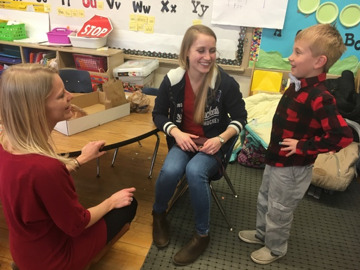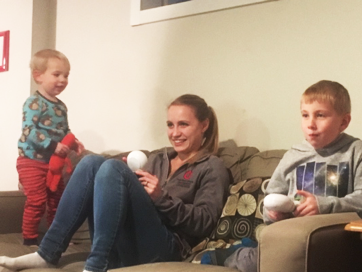"A Day in the Life" (OH LEND)
May 6, 2019

|
The Nisonger Center Leadership Education in Neurodevelopmental Disabilities (LEND) program at the Ohio State University aims to address disparities in the availability and quality of health services for individuals with neurodevelopmental disabilities through interprofessional training in leadership, scholarship and community partnerships that impact health care and community systems.
As a part of the LEND program trainees from a variety of health-related disciplines:
- Attend courses on neurodevelopmental disabilities, autism, and leadership,
- Practice in an interdisciplinary diagnostic clinic setting,
- Engage in service opportunities,
- Advocate on behalf of individuals with neurodevelopmental disabilities and their families, and
- Engage in leadership and research projects. One of these leadership projects is called "A Day in the Life" and is led by two family faculty members at Nisonger Center who are parents of children with neurodevelopmental disabilities.
"A Day in the Life" connects trainees with families of children with neurodevelopmental disabilities. These families spend time with the trainees, allowing them into their homes and into their lives. "The leap of faith that it takes to reveal your family to someone else, this is probably the most vulnerable they are in their life." - Ellen Cook, Parent Faculty. So why would we have families engage in such a challenging, vulnerable project? To develop empathy and growth in our trainees, so that they can carry these lessons into their practice. We hope this project will help to "increase empathy and realistic, feasible recommendations" for future professionals - Ellen Cook and Linda Rittenhouse, LEND Family Faculty.
The idea for this project started after listening in on a lecture in one of the interdisciplinary courses where trainees and health professionals were sharing frustration surrounding compliance issues among families and difficulty with follow-through of recommendations for home programming for their child(ren) with neurodevelopmental disabilities.
"We wanted to give the trainees a slice, and I know it's a really small slice, but a slice of the reality of the family unit of a child with a disability and the true ins and outs, like taking your kid to a birthday party for god sakes! Or the dentist! Things that are often taken for granted by a typically developing family can really be a challenge, so we wanted to give the trainees a slice of that" - Ellen Cook. "A lot of these programs and recommendations sound wonderful and are great resources, but in reality it's a lot harder and it's not that easy to implement them" - Linda Rittenhouse.
The goal was for trainees to get to know the families better, consider their perspectives, and consider the limitations and facilitators in their day-to-day life so that they could tailor recommendations for that family.
An idea was born! Now, Ellen and Linda could set forth in developing a new type of project for LEND trainees. They developed manuals for participating families and trainees, identified families, and matched them with trainees. The manuals describe the process, asks trainees to journal and reflect upon their experiences, and asks families to invite trainees to join them in scenarios where they may see some of the stressors that otherwise would be unknown to the health professional. Family faculty identified families who exhibited signs of strength, resiliency, and confidence in their parenting abilities and tried to match them with a trainee. Families receive a stipend for their participation. This leadership project was very popular with trainees when they ranked their leadership project requests for the year.
April Horstman, an Occupational Therapy trainee, describes her desire to participate in this project. "I chose to participate in this leadership project because I wanted to get a true look at everyday life within the home and community for families of children with disabilities." April was matched with the Holmes family. Abby Holmes is the mother of two boys: a 6-year old son with Autism, named Harry, and a 2-year old son named Eli. She described her interest in participating in this project as an opportunity to be a resource. "Parent to parent resources were most helpful to me, of course that may be different for others, but I'm all about getting it out there - we are not embarrassed or ashamed, we want to help others learn that the brain is just wired differently for people with Autism" - Abby Holmes.
"The Holmes family has been so welcoming and open to me about their experience of having a 6-year-old son with Autism Spectrum Disorder." - April Horstman.
April visited the Holmes family home several times. She attended community events such as semi-structured music class, an occupational therapy session, a Sunday brunch with extended family, and a Valentine's Day celebration at school. "I have observed this family's routines, roles, and values. I have gained an understanding of their unique challenges, but also various supports available to counter those challenges. From this experience I am learning how to be a family-centered practitioner, as well as an advocate for families with children with disabilities. I am thankful to the Holmes family for being great teachers and advocates!"
Abby also reported that this project was a great experience for her and her family. "I would 100% do it again!" She reports "Harry loves April!" She joined them for intimate family brunches, introduced the Holmes to her fiancé, and "really became a part of our family" - Abby Holmes.

Of course, every project is not without its challenges. The family faculty, trainees, and families all reported difficulty with scheduling. "Scheduling with graduate students can be a big challenge, especially when you want to time it out to be able to expose her to everything Harry does!" - Abby Holmes. The family faculty also explained it could be difficult to navigate permission to join the children and families in certain settings, specifically school. "We're trying to get it set up so that they can go to school with the kids next year - go see recess, lunch, the bus!" - Linda Rittenhouse.
As the LEND year is ending, the families are offering trainees last minute opportunities to join them in community activities. Trainees are preparing their poster presentations to share their experiences with other health professionals and legislators at the Ohio MCHB Poster Symposium. The family faculty are also actively working to improve the project for future years. The goal is that eventually every trainee in the LEND program would be matched with a family to enhance their understanding and improve family-centered care in their clinical and research practices. Additionally, family faculty expressed an interest in having trainees match with families with younger children and then older children, adolescents, or young adults to better understand the family experiences throughout the lifespan.
Acknowledgements: Ellen Cook, Linda Rittenhouse, Abby Holmes, April Horstman







